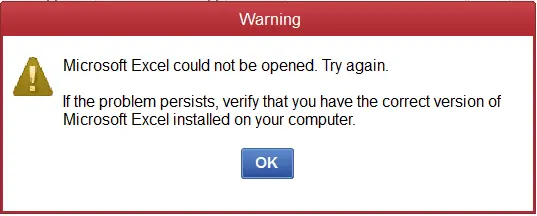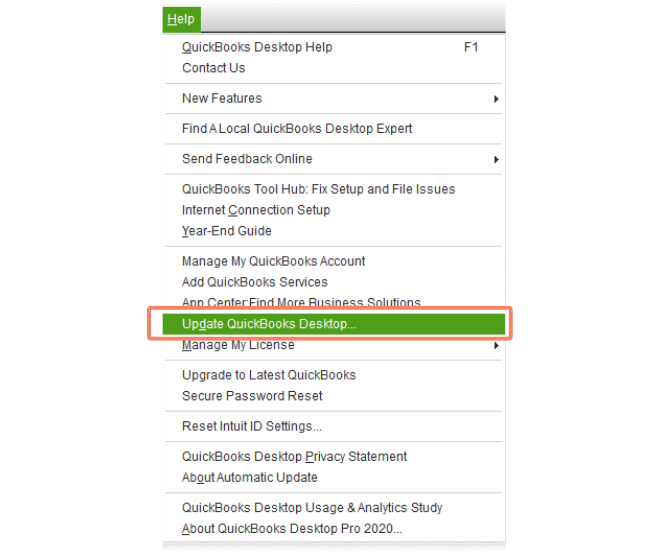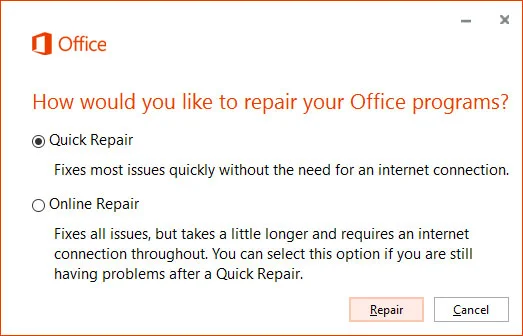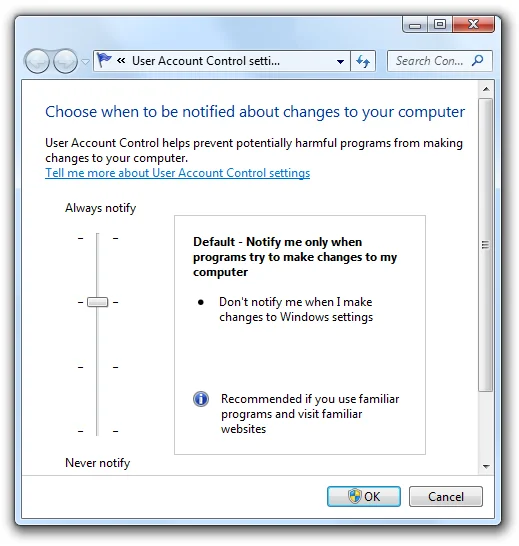The “QuickBooks unable to export to Excel” error arises when the software fails to transfer the data. Among all the other issues, this is one of the most persistent ones. Many QB users have suffered from this error and have faced significant difficulties trying to address it. In this article, we will give you detailed insight into this error and will also share effective troubleshooting methods to fix it.
The QuickBooks unable to export to Excel error can be highly persistent, and a technical hand is required to solve it. In case you wish for professional guidance to troubleshoot it, then feel free to reach out at +1(800) 780-3064 to connect with an expert.
Common Causes Behind The QuickBooks Export to Excel Failure

Unlike other error messages, the name of this error is enough to suggest what it means. However, the unable to export to excel from QuickBooks error does not come with any reliable text as to understand the causes behind it. Moreover, there can be multiple reasons behind it, and the most common of them are.
- Either QuickBooks or Excel has not been updated for a long time.
- Updates prematurely ended or failed to install properly.
- Files of the Excel software got corrupted.
- Restricted Windows User Account Control (UAC) Settings may cause the QuickBooks unable to export to Excel.
- You may be using an incorrect format while exporting.
Troubleshooting QuickBooks Export to Excel Not Working
While this error can be caused by multiple reasons, you don’t need a myriad of methods to fix it. You can simply follow the mentioned below troubleshooting hacks to address the error when you can’t export reports from QuickBooks to Excel.
Solution 1. Ensure That You Are Using The Correct Exporting Method
One thing you need to check before diving into the deep troubleshooting methods is whether you are correctly exporting the Excel file or not. To double check that you are correctly exporting the files, you follow the below mentioned steps.
- Run the Customer Center and go to the Transition panel.
- From this panel, you can select the file that you want to export to Excel.
- After that, locate the Excel button and create a new worksheet.
- This step will automatically create a new Excel sheet with all your data copied and pasted on it.
- Locate the Item button from the main menu and click on List.
- Go to the open Item List and then Report menu.
- Lastly, choose Export to Excel.
Solution 2. Fix Excel Files On Your System
In case the Excel files have been corrupted, then you will see the QuickBooks unable to export to Excel error. You can fix it by following these easy steps.
- Open the Settings panel in your system.
- Then go to Apps > Apps and Features.
- Locate Excel and right-click on it.
- Lastly, choose the Modify option from the menu.
Solution 3. Update The QuickBooks Desktop Client

In case you are still unable to export to Excel from QuickBooks desktop, then you may try updating the QB software. To address this, you don’t need to manually configure the files, as you can just update the whole software.
- Open the QuickBooks desktop application and locate Help from the menu, then click on Update.
- After that, choose Update Now and click on Get Updates.
Once that is done, you will need to close and reopen the application to solve QuickBooks export to Excel not loading.
Solution 4: Repair Microsoft Office

In case you are still seeing the QuickBooks unable to export to Excel error, then it is safe to assume that Microsoft Office in your system is the causes behind it. You can take the first step to repair it by opening the Control Panel in your system.
- Once this panel loads up, open Programs and Features settings.
- Locate your Microsoft Office and right-click on it.
- Then select Change.
- Doing so will take you to the Apps and Features panel.
- In this list, locate Microsoft Office (it may also be named Microsoft 365).
- Once you have located it, choose the Modify option to repair the software.
Solution 5: Reinstall The QuickBooks Software
If the QuickBooks unable to export to Excel error remains persistent, then it is likely that something has gone wrong with your QB desktop software. There can be many reasons, such as files have been corrupted beyond repair, it failed to install an update, or it was unable to read files, much less export them. Nevertheless, most of these can be addressed by simply reinstalling the program and making a few changes in the files. Before you follow the mentioned below steps, however, do make sure that your Microsoft Office and Excel are up to date.
- Uninstall the QB desktop application and also remove it from the Recycle Bin.
- Once done, open your File Explorer.
- Locate the folders containing the QB files.
- These folders contain the basic data of the QB application that you just removed. However, there is no need for you to uninstall them as well. Renaming these folders is the optimal choice, as the application will not be able to read them, and you will be able to recover the data in case it gets lost.
- You can simply add “old” at the end of your folders name.
Precautions to Prevent The QuickBooks Unable to Export to Excel Error

With the steps that we have mentioned above, you will be able to address the Excel export error. However, in order to prevent any recurrence of this error, you will need to take some extra precautions. Below, you can check our handpicked precautions to prevent the future occurrence of this error.
- Regularly check your system’s compatibility with both the QuickBooks Desktop and Microsoft Excel applications. In case the minimum requirements are not met, then it is recommended that you upgrade your system.
- Use the “.xls” format while exporting. This is the correct file format to export to Excel. Avoid using other formats as they may cause QuickBooks unable to export to Excel.
- This error message can also be caused by user permission restrictions. Check that all the necessary permissions have been allowed. These permissions will also help you avoid access-related issues with the software when exporting to Excel.
By following the mentioned above precautions, you will be able to prevent the QuickBooks export to Excel unresponsive error.
To Conclude
QuickBooks stands among the best accounting software, and the ability to export the data to Excel is highly impressive. Exporting the files to Excel helps to easily manage the data and update it. However, this impressive feature will completely stop once the QuickBooks unable to export to Excel error pops up. Although this error can be pesky, you can address it by following the troubleshooting methods mentioned in this post.
In case you are facing difficulties shooting this error or have any questions, then don’t hesitate to reach out to our team of experts at +1(800) 780-3064.
FAQs: QB grayed out or freezes when exporting to excel
Why is my QuickBooks export to Excel options grayed out?
How can I export QB data to Excel?
Why can I not save the QuickBooks exported Excel files?
Does QuickBooks allows to open files in Excel?
Why can’t I export my QuickBooks files to Excel?

Gabby Taylor, combines financial expertise with literary prowess. With over a decade in finance, she crafts insightful narratives on navigating fiscal complexities
